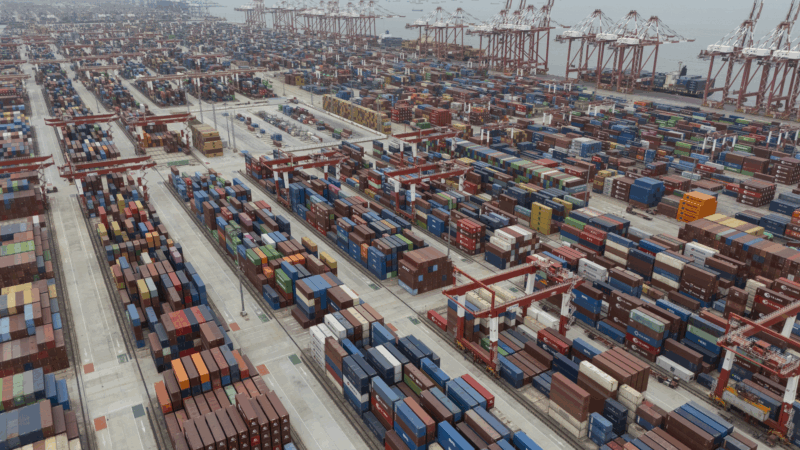U.S. and Chinese officials will meet in Geneva in first sign of thaw in trade war
HONG KONG — U.S. and Chinese officials have announced they will meet in Switzerland later this week, signaling a possible détente in the escalating trade war between the global superpowers.
Treasury Secretary Scott Bessent and U.S. Trade Representative Jamieson Greer will meet Beijing’s lead economic representative, He Lifeng, potentially paving the way for broader trade talks.
In an appearance on Fox News, Bessent said the current tariffs aren’t sustainable and are “the equivalent of an embargo.
“We don’t want to decouple. What we want is fair trade,” he said.
The U.S. and China have been locked in a tit-for-tat trade war, with both sides imposing hefty, triple-digit tariffs on each other’s goods, making trade between the world’s two largest economies near impossible.
Investors and global policymakers will be looking for any signs of an off-ramp, as the ongoing trade war threatens a global recession.
China and the U.S. “need to move on,” said Alicia Garcia-Herrero, chief economist for the Asia Pacific at French bank Natixis. “I think both parties are keen to negotiate.”
President Trump placed what he called reciprocal tariffs on China and many other countries in early April. When China retaliated with similar duties on U.S. goods, Trump responded with even higher tariffs. At the moment, Chinese goods into the U.S. face tariffs of 145%, and U.S. goods into China are subject to 125% tariffs.
In recent weeks, the U.S. and China have been engaged in a geopolitical blinking contest, waiting for the other side to reach out. Trump said in an interview with Time that he would not call Chinese President Xi Jinping, and added that Xi has in fact called him. Chinese officials refuted that claim, and later said that the U.S. has made multiple overtures seeking trade negotiations.
The talks in Switzerland are the first concrete sign of a potential thaw in the deadlock.
For the negotiations to yield substantial results, the U.S. must adopt “a proper attitude,” political commentator Ming Jinwei said in an editorial published on Guancha, a Chinese news site which often reflects perspectives aligned with Chinese state interests.
Ming added that Treasury Secretary Bessent needs to reassess his understanding of China’s strength.
“He has repeatedly claimed that China needs the U.S., but the U.S. does not need China. This perception is both incorrect and arrogant,” he wrote.
With both sides already feeling the effects of the trade war, Garcia-Herrero predicts a trade deal will be struck quickly, with the U.S. removing the steep reciprocal tariffs but keeping 20% duties on Chinese goods.
“The deal will be announced as a minor thing because they have convinced their constituencies that the other side is evil,” Garcia-Herrero said. “So they cannot really change that mantra now.”
A spokesperson for China’s commerce ministry said on Wednesday that China’s door remains “open for negotiation” but that it will not “sacrifice its principles” for just any agreement.
NPR’s Aowen Cao contributed to this report.
‘Dawson’s Creek’ star James Van Der Beek has died at 48
Van Der Beek played Dawson Leery on the hit show Dawson's Creek. He announced his colon cancer diagnosis in 2024.
A Jan. 6 rioter pardoned by Trump was convicted of sexually abusing children
A handyman from Florida who received a pardon from President Trump for storming the U.S. Capitol on Jan. 6, 2021, was convicted on state charges of child sex abuse and exposing himself to a child.
A country-pop newcomer’s debut is your reinvention album of 2026
August Ponthier's Everywhere Isn't Texas is as much a fully realized introduction as a complete revival. Its an existential debut that asks: How, exactly, does the artist fit in here?
U.S. unexpectedly adds 130,000 jobs in January after a weak 2025
U.S. employers added 130,000 jobs in January as the unemployment rate dipped to 4.3% from 4.4% in December. Annual revisions show that job growth last year was far weaker than initially reported.
Greetings from Mexico City’s iconic boulevard, where a dog on a bike steals the show
Every week, more than 100,000 people ride bikes, skates and rollerblades past some of the best-known parts of Mexico's capital. And sometimes their dogs join them too.
February may be short on days — but it boasts a long list of new books
The shortest month of the year is packed with highly anticipated new releases, including books from Michael Pollan, Tayari Jones and the late Nobel laureate Mario Vargas Llosa.






